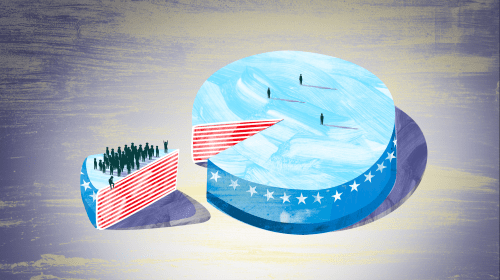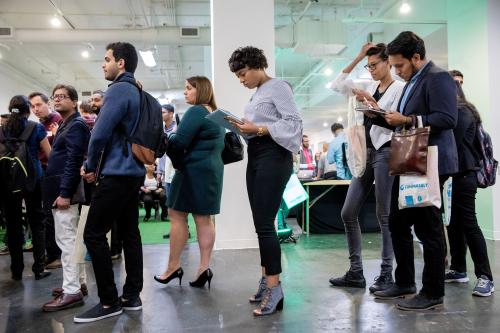This op-ed was originally posted in Real Clear Markets.
To defeat Trump in the upcoming election, Democrats are advancing a set of proposals engineered to excite their base: a single payer health system, college for all, a guaranteed jobs program. All are worthy of debate but perhaps the problems go deeper. Perhaps they go to the core of our beliefs about how the world works, what makes the economy tick, and how this relates to human welfare.
The dominant paradigm right now is what is sometimes called Neoliberalism which I define as a belief in the efficiency of markets. Those on the left believe that a market economy needs more than a little help from government. There are social costs and benefits that markets ignore; economic downturns are not self-correcting; and a lack of competition or transparency can harm consumers. By addressing these and other shortcomings, government can free the market to do what it does best. Still, the central belief is that markets are the most efficient way to organize a society and by extension optimize individual freedom.
Critics of this paradigm note that it is fundamentally flawed. Human beings are not just consumers, they don’t always behave rationally, and they don’t always maximize their own well-being. They need a sense of community, they care about the welfare of others, and their sense of what matters goes well beyond a larger GDP. They respond not just to economic incentives but to the desire for respect from their peers, to social norms, and to moral or religious principles. There is an efficient allocation of resources to go with every possible allocation of dollar votes and the distribution of dollar votes should be a communal decision arrived at by democratic means.
Human beings are not just consumers, they don’t always behave rationally, and they don’t always maximize their own well-being.
At the core of the neoliberal theory – arguably its most influential precept — is the idea that people are paid what they are worth. If incomes are unequal it’s because skills and talents are unequal. The rich deserve their riches because, for the most part, they earned them. The poor lack income because they have too little education or the other skills needed to get ahead. There is a lot that’s ignored in the wages equal marginal productivity equation: the asymmetry of bargaining power, the difficulty of discerning who contributes what, the stickiness of established wage norms and employment relationships, and the lack of competition. So, yes, productivity matters and the importance of investing in human capital makes sense, although not as much as your economics 101 textbook suggests.
As an economist, I was schooled to think along neoliberal lines and still hang out with people for whom this type of thinking is second-nature. I wouldn’t want to throw out the existing paradigm unless I thought there was something better in the wings. But I am becoming wobbly. Why? Because the evidence is mounting that a) the assumptions of neoliberalism are unrealistic and b) it has led to distrust of almost any kind of government action to temper or complement market activity. As the former French Prime Minister Lionel Jospin put it, we can “say yes to a market economy but say no to a market society”.
In my 2018 book, The Forgotten Americans, An Economic Agenda for a Divided Nation, I take some tentative steps in the direction of questioning the wisdom of prevailing economic ideas. I show how hard it is to raise the growth rate, how wages are no longer tracking productivity, how the nation’s income is being reallocated from labor to capital, how compensation at the top has gone through the roof for reasons that remain opaque, how companies that share their profits and treat their workers well are often more successful than those that don’t, and that wage gaps between firms and nations have more to do with market power or institutional factors than with productivity.
Still, I am not ready to abandon neoliberal insights entirely for three reasons. First, because I don’t want to throw the baby out with the bath water (after all, markets do good work); second, because I don’t know where this critique takes us; and third because even if I knew, it would likely be a long time before the critique turned into a workable agenda. Moreover, many mainstream economists are well aware of the flaws in the simple-minded model they teach their students. Unfortunately, too many elected officials, business leaders, and ordinary citizens have forgotten the caveats.
In the midst of having this debate with myself, I read a very provocative essay by Larry Kramer, the president of the Hewlett Foundation. He appears to be getting wobbly too. He is calling for a lot more attention to rethinking the basic neoliberal paradigm. He notes that Friederich Hayek, Milton Friedman, and others earlier started an ideas revolution by investing heavily in big ideas that transformed how people thought about the economy and society. That effort led to Reaganism, to Thatcherism, to supply-side economics, and to some welcome deregulation and more limited government. Central planning, after all, had failed. But it also led to tax cuts and then more tax cuts under Reagan, Bush, and Trump, all of which starved the government of resources and made it impossible to deal with the human costs of globalization and technology or an impending environmental disaster. Starving the beast worked. The lack of resources killed liberal efforts to soften the edges of capitalism, left too many behind, and finally brought us Trump. To save capitalism we may need to reinvent it.
I don’t know what a new paradigm would look like. I’m still a little skeptical but I’m prepared to at least start thinking about it. Steven Pearlstein, a columnist with the Washington Post, has written a terrific book on why capitalism is not moral. Why, he asks, should those of us who won the lottery of birth have far more riches than those who didn’t? Thomas Piketty captured our attention with his argument that capitalism almost inevitably leads to extreme concentrations of wealth. Economists are, thankfully, becoming less theoretical and more empirical. Raj Chetty and his colleagues are making waves with data, not theory. When the likes of Daniel Kahneman and Richard Thaler win the Nobel prize, you know that change is coming. But Larry Kramer is also right to want to encourage more of this type of thinking. We need to rethink many of our assumptions and ask harder questions about what promotes human flourishing. It’s more than a well-functioning economy.
The Brookings Institution is committed to quality, independence, and impact.
We are supported by a diverse array of funders. In line with our values and policies, each Brookings publication represents the sole views of its author(s).







Commentary
Op-edWe need to rethink our economic assumptions
May 7, 2019